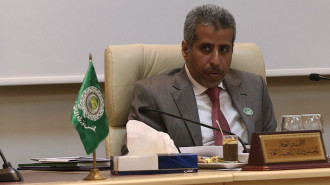Breadcrumb
Egypt raises import tariffs by up to 60 percent
Egypt's president has imposed a second increase of tariffs on hundreds of imported products, according to an official decree published on Thursday.
President Abdel-Fattah al-Sisi's long list of over 350 items including fruits, foods, perfumes, furniture, and others was published by the official Gazette, which confirmed customs duties increased between 40 and 60 percent.
This is the second time this year the government has raised taxes on what it described as luxury commodities.
The measure comes nearly a month after the government floated its currency and raised fuel prices to qualify for a $12 billion bailout from the International Monetary Fund. The bailout is hoped to improve Egypt's economy after years of unrest.
Besides the IMF loan, Egypt received $4.6 billion from 62 grants and loans in 2016. This included a total of 36 loans worth $4.27 billion.
Just weeks later, an Egyptian filed a lawsuit against President Abdel Fattah al-Sisi demanding a halt to the proceedings of the loan which he described as unconstitutional.
Ali Ayoub announced in a Facebook post that he filed the lawsuit with Cairo's Administrative Court also against Prime Minister Sherif Ismail, Finance Minister Amr al-Garhy, and central bank governor Tarek Amer.
The three-year $12 billion loan approved by IMF's executive board is "unlawful as it should have been reviewed by the parliament", Ayoub explained.
"The cabinet did not consult with the parliament over the big loans or the issuance of $4 billion worth of international bonds in the Irish Stock Exchange," Ayoub said.
The loan announcement by the global crisis lender comes after Cairo took crucial preliminary reform steps in recent weeks to meet IMF requirements, including cutting fuel subsidies, announcement of a value added tax, and floating the Egyptian pound, which subsequently lost 45 percent of its value against the US dollar.
Egypt is reeling after six years of political and economic turmoil involving the ousters of two presidents.
Cairo governments had avoided implementing the economic reforms for years fearing unrest, but Sisi said Egypt no longer has the luxury of postponing them.
Loans from Saudi Arabia and China will help Egypt gather the $5-$6 billion in additional financing required to complement the IMF loan.






![Anthony Blinken speech [Getty] Anthony Blinken speech [Getty]](/sites/default/files/styles/image_684x385/public/media/images/6263436E-8ACD-4D3C-9055-25A7BE79DD5A.jpg?h=d1cb525d&itok=fLHmHCRG)
 Follow the Middle East's top stories in English at The New Arab on Google News
Follow the Middle East's top stories in English at The New Arab on Google News
![Maj Gen Ali Nour al-Din al-Naasan appointed new Syria's army chief [Twitter]](/sites/default/files/styles/image_330x185/public/2025-01/new%20Syrian%20nilitary%20chief.jpg?h=19839aca&itok=6tb5qhNB)
![Gaza death toll [Getty]](/sites/default/files/styles/image_330x185/public/2192491071.jpeg?h=a5f2f23a&itok=1V9vL9X5)
